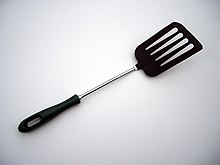
A fish slice is a kitchen utensil with a wide, flat blade with holes in it, used for lifting and turning food while cooking.[1] It may be called a slotted spatula or a turner[2] or flipper.[3] The utensil was originally designed as a serving piece rather than a cooking implement.
History[edit]

The fish slice was originally an item of silver service used for serving fish at a dining table and was generally made of silver or Sheffield plate rather than copper or tinned iron to avoid the possibility of affecting the taste of the fish.[4]
The first known slices intended specifically for serving fish were mentioned in 1730.[4] Starting with the 1740s they were often shaped as or decorated with representations of fish.[4] By the 1770s, large numbers were manufactured.[5] By the early 1800s, most flatware services included a fish slice.[4] Antique examples commonly appear at auctions[6] and are held in the collections of multiple museums.

The term evolved to refer to any slotted or pierced implement used for turning foods when frying them; modern versions are available in many materials such as stainless steel, nylon, and silicone and are typically undecorated and shaped as spatulas.[citation needed]
In collections[edit]
The Victoria and Albert Museum has an extensive collection of metalwork fish slices from Britain and the US and includes both contemporary and historical pieces. Manufacturers include functional items, for example some from Josiah Wedgwood[7] to more sculptural contemporary works by Ane Christensen.[8]
Similar utensils[edit]
Other examples of serving slices include those for serving cakes, pies, and other desserts; the pudding trowel or pudding trowle is a predecessor of the fish slice.[4][5]
See also[edit]
References[edit]
- ^ "fish slice". dictionary.cambridge.org. Archived from the original on 3 May 2022. Retrieved 13 April 2021.
- ^ Preston, Marguerite (28 July 2019). "The Best Spatulas (Turners) for Nonstick Pans". Archived from the original on 8 July 2020. Retrieved 8 July 2020.
- ^ "FLIPPERS". 17 September 2019. Archived from the original on 25 September 2020. Retrieved 8 July 2020.
- ^ a b c d e "Serving up: silver slices · V&A". Victoria and Albert Museum. Retrieved 1 January 2024.
- ^ a b Fish slice, Victoria and Albert Museum, 1814–1815, retrieved 1 January 2024
- ^ Institute, Sterling and Francine Clark Art; Mass.), Sterling and Francine Clark Art Institute (Williamstown; Wees, Beth Carver (1997). English, Irish, & Scottish Silver at the Sterling and Francine Clark Art Institute. Hudson Hills. ISBN 978-1-55595-117-7. Archived from the original on 11 October 2023. Retrieved 25 October 2022.
- ^ "Fish slice | Josiah Wedgwood's factory | V&A Search the Collections". V and A Collections. 7 February 2020. Archived from the original on 11 October 2023. Retrieved 7 February 2020.
- ^ "Fish slice | Christensen, Ane | V&A Search the Collections". V and A Collections. 7 February 2020. Archived from the original on 11 October 2023. Retrieved 7 February 2020.
Further reading[edit]
- Rabinovitch, Benton Seymour; Macapia, Paul, eds. (1991). Antique silver servers for the dining table: style, function, foods, and social history. Concord, Mass: Hall. ISBN 978-0-9628570-0-3.